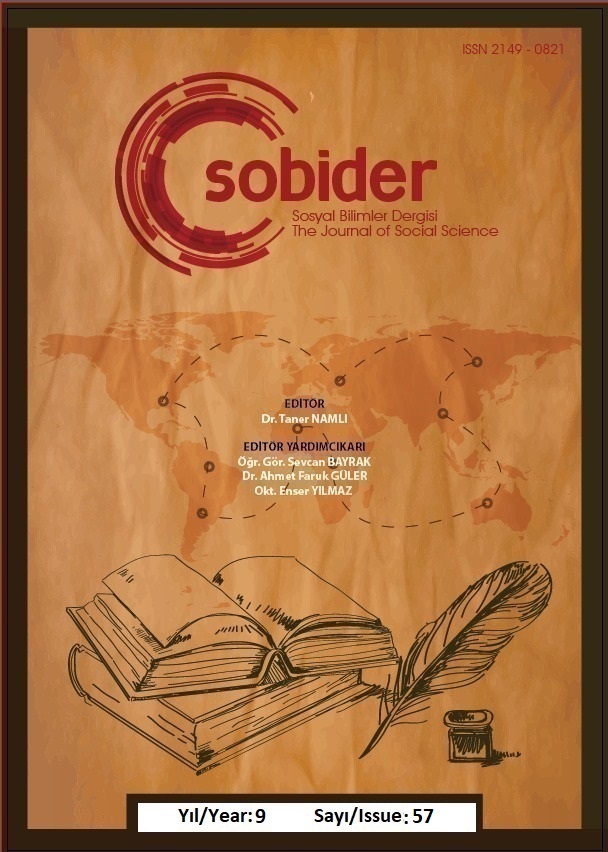Author :
Abstract
Tüm zaman ve mekânlara hitap eden, ilahi mesajıyla yaşamın her alanını içine alan Kur’an-ı Kerim’i okumak, anlamak, yaşamak bu yüce vahye muhatap olan insanın en temel gayesidir. Nisa suresinin 82. ayetinde geçen “(Okudukları) Kur’an’ı (hiç) düşünmezler mi? Yoksa kalpleri üzerinde kilitler mi var? (kalpleri düşünmeye kapalı mıdır?)”ifadesi Kur’an’ı üstünkörü, yüzeysel okuyup geçmemeyi, ihtiva ettikleri deruni manaları düşünüp incelemeyi ve mesajı “görmek” için tefekkürü, tedebbürü emretmektedir.
İnsanlığa hidayet rehberi olarak gönderilen Kur’an-ı Kerim’i anlama çabaları sonucunda çeşitli ilimler oluşmuştur.Bu çabaların sonucu oluşan mühim ilimlerden biri hiç şüphesiz Kur’an ilimleridir.
Kur’an İlimlerinin en kadim ve günümüzde de en çok tartılşılan önemli bir meselesi nesih meselesidir.
Tefsir ilminin konusu Kur’an olması sebebiyle fıkıh başta olmak üzere kelam ve hadis gibi diğer ilimi disiplinleri de etkisi alanı altına almıştır.Bundan dolayı tefsir,fıkıh ve kelamî boyutta nesihle ilgili müstakil eserler yazılmış buna rağmen problematiği çözüme kavuşmamış ,günümüzde de halen tartışılan , bundan sonra da tartışma meselesi olmaya devam edecek olan bir meseledir.
Kur’an ayetlerinin doğru bir şekilde anlaşılması, nesh meselesinin çözüme kavuşması ile olur.Çünkü Kur’an Temel İslâm Bilimleri alanında var olan bütün ilimlerin hiç şüphesiz ana kaynağıdır. Bu da tefsircilere Kur’an ayetlerinin en anlaşılabilir hale getirilmesi sorumluluğunu yüklemektedir.Biz bu çalışmamızda ilk olarak neshi kavramsal çerçevede ele aldıktan sonra neshe konu olan ayetleri Mehmet Sait Şimşek’in Hayat Kaynağı Kur’an Tefsiri adlı eseri bağlamında ele alıp neshe olan yaklaşımını incelemeye çalışacağız.
Keywords
Abstract
Reading, understanding and living the Qur'an, which appeals to all times and places and encompasses all areas of life with its divine message, is the main goal of the person who is the addressee of this supreme revelation. “Do they not (never) think about the Qur'an (which they are reciting) mentioned in verse 82 of the chapter of Nisa? Or do they have locks on their hearts? (Is their heart closed to thinking?)” orders not to read the Qur'an superficially, to think and examine the inner meanings it contains, and to contemplate and reflect in order to "see" the message. Various sciences have emerged as a result of the efforts to understand the Qur'an, which was sent as a guide to humanity. One of the important sciences that emerged as a result of these efforts is undoubtedly the sciences of the Qur'an. One of the most ancient and most controversial issues of the Qur'anic Sciences is the issue of abrogation. Due to the fact that the subject of tafsir is the Qur'an, other scientific disciplines such as theology and hadith, especially fiqh, have been under its influence. It is an issue that will continue to be a matter of debate from now on. The correct understanding of the verses of the Qur'an is achieved by the solution of the issue of abrogation. Because the Qur'an is undoubtedly the main source of all the sciences in the field of Basic Islamic Sciences. This puts the tafsirers in charge of making the verses of the Qur'an most understandable. In this study, we will first examine the abrogation in the conceptual framework, and then examine the verses that are the subject of abrogation in the context of Mehmet Sait Şimşek's Life Source Qur'an and examine his approach to abrogation.
Keywords
- Ateş,Süleyman “Yüce Kur’an’ın Çağdaş Tefsiri” ,Yeni Ufuklar Neşriyat , İstanbul 1988
- Cevherî, İsmâil b. Hammâd, Tâcu’l-Lüga ve Sihâhu’l-Arabiye, thk. Ahmed Abdulğafûr Attar, Beyrut: Dâru’l-İlm, 1987
- Cerrahoğlu,İsmail,Tefsir Usulü, T.D.V.Y ., Altıncı Baskı ,Ankara 1988
- Çetin,Abdurrahman, TDV İslâm Ansiklopedisi, İstanbul,2006
- Demirci,Muhsin, “Tefsir Usulü”, s. 243.; Ömer Dinç, “Hicri İlk Üç Asır Bağlamında Nesh Meselesinin, Tarihi Süreci Üzerine Bir Tahlil Denemesi”, III. Türkiye Lisansüstü Çalışmalar Kongresi Kitabı, 15-18 Mayıs 2014, Sakarya, Basım İstanbul 2014
- Davutoğlu ,Ahmed,Sahih-i Müslim tercüme ve Şerhi’ İstanbul, 2017
- Gezgin,Ali Galip, Kur’ân’da ‘Nesh Problemi’ne Eleştirel Bir Yaklaşım, İslami Araştırmalar Dergisi, Sayı:1, 2001
- İbnü’l-Barizi, Hibetullah b. Abdrirahman ,Nashu’l-Kur’ani’l –Aziz ve Mensuhihi, Bağdat, 1402/1982
- İbn Kesir,Ebü’l –Fidâ “Tefsiru’lKur’ani’l Azim”, c. II, Beyrut, 1986
- İbni Teymiye, Ebü’l-Abbâs Takıyyüddîn Ahmed b. Abdilhalîm b. Mecdiddîn Abdisselâm el- Harrânî,“Mecmuatü’r-Resaili’l Kübra”, Beyrut 1395/1975, 1982
- Karaman ,Hayreddin. Kur’an-ı Kerim Meâli, İstanbul, 2017
- Şimşek, M. Sait “Kur’an’ın Anlaşılmasında İki Mesele”, Kitap Dünyası, Baskı 6, Konya 2016
- Şimşek, M. Sait, “Hayat Kaynağı Kur’an Tefsiri”, Beyan Yayınları, c. 1, Ocak, 2012
- Şimşek, M. Sait, “Kur'an’da Nesh Meselesi”, Necmeddin Erbakan Üniversitesi İlahiyat Fakültesi Dergisi, Konya 1986
- Zürkânî, Menâhilü’l-ʿirfân (nşr. Fevvâz Ahmed Zemerlî), Beyrut 1415/1995
- Zuhayli , el-Fıkhu- İslamiyyü ve Edilletühü , çev: Ahmet Efe v.d. Risale ,İstanbul ,1991





